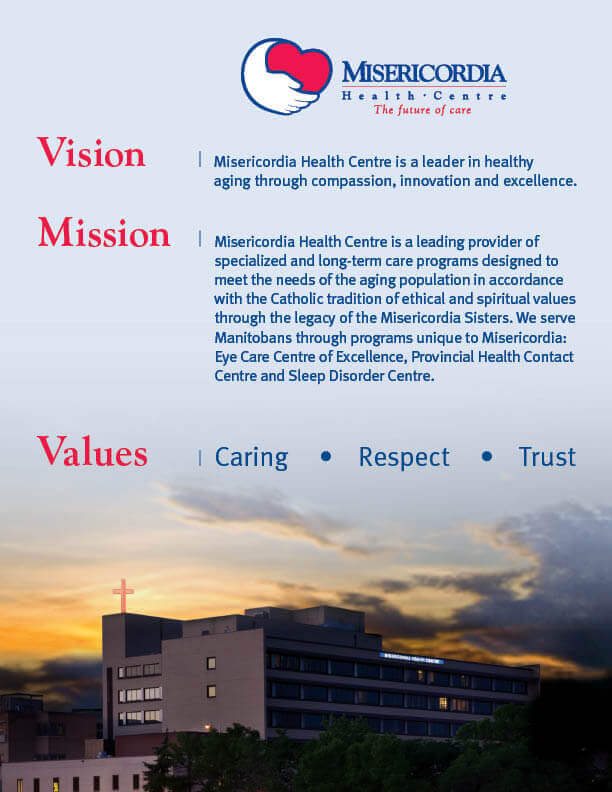Author: Heidi Klaschka
Marianne Neuman, Home Care
Marianne Neuman, Home Care
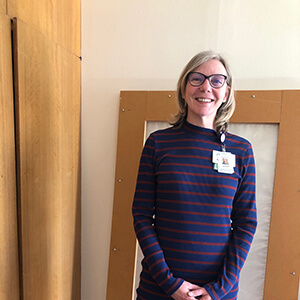
The COVID-19 pandemic is changing our world and health-care professionals are on the front lines.
Marianne Neuman returned to Winnipeg after living in Alberta for two years, starting her role as a Home Care coordinator on March 23, right in the height of COVID-19.
“COVID-19 added extra challenges on top of what is already a challenging situation,” says Marianne on creating discharge plans for MHC clients in Transitional Care Units (TCU).
MHC Home Care focuses on a holistic approach to transitioning clients home after their stay at TCU. Marianne and the TCU team work collaboratively to ensure individuals have the supports they need to live independently, whether at home, in assisted living, supportive housing, or living with a family member.
“We’ve experienced delays in discharges,” says Marianne, noting this is especially prevalent in complex- care situations. “We’ve had to work extra closely with family members and loved ones.”
Family members and loved ones are critical in helping with discharge – picking up medications, groceries and supplies, as clients leaving transitional care will have to self-isolate for 14 days in their new home. Many caregivers are part of the “sandwich generation,” meaning they care for their children and also (an) elderly parent(s). COVID-19 adds an extra layer of stress to caregivers who may already be burned out.
“It’s hard to reassure people who fear the virus,” she notes while discussing the general anxiety of clients and their families.
“We’ve always had to get creative and be open to problem-solving ideas. Right now, there’s an even higher need to think creatively.”
While thinking critically and creatively is important, following precautions and proper PPE is always top of mind for Marianne.
Keep COVID-19 informed by visiting: covid19manitoba.ca
#mhcfamily #healthcareheroesMB #COVID19
Art-making continues in West Broadway
Coronavirus update
Mitch Rouire, Storm Café MHC
Mitch Rouire, Storm Café MHC
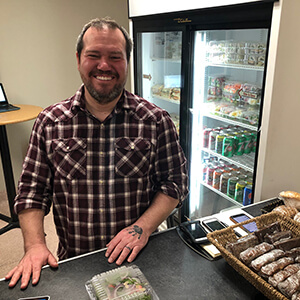
The COVID-19 pandemic is changing our world and health-care professionals are on the front lines.
Storm Café MHC opened March 24, 2020 in the midst of the COVID-19 pandemic.
“We already had the contract signed to open in the spring,” explains Mitch Rouire, co-owner with his wife Jennifer Clark-Rouire, a professional curler. “MHC asked if we could come in early to feed staff working extra hours … and with so many new Health Links – Info Santé staff and most restaurants being closed in the neighbourhood.”
Mitch says his Misericordia experience has been “awesome” so far with incredibly friendly staff and so easy to deal with in terms of getting the café up and running.
It’s still very much a work in progress as he expands slowly and looks forward to upcoming renovations to the “seating area” of the cafeteria.
Storm Café MHC will have a more defined and smaller footprint than its current space as MHC develops a more welcoming open-concept shared space for staff and the public alike. Today, Mitch’s decorations include colourful drawings from sons Lucas, 12, and Felix, 9.
Storm Café MHC opened with a “grab-and-go” cold menu items prepared offsite: baking, salads, sandwiches and wraps available during the day in the café and after hours in Mitch’s vending machine in the cafeteria seating area.
Mitch already feels like a member of the Misericordia family and was happy to offer our Foundation a reduced price on meal coupons for every MHC staff member, generously donated by Winnipeggers to the MHCF COVID-19 relief fund.
With the go-ahead from the health inspector, Mitch was able this week to begin offering limited hot items such as burgers and fries made from scratch and the classic ‘BOB.”
“I was going to offer frittata for breakfast,” said Mitch, “but at least 40 staff told me I had to have a ‘Breakfast on a Bun’ on the menu.”
Mitch is always looking for menu suggestions and encourages staff to share with him their favourites. He says he happened in to catering quite by chance after running the business side of Festival de Voyageur for years.
“Before buying Storm Catering, which catered the Festival, I had zero food experience,” he says candidly. His family catering business expanded into a variety of other venues, such as the Seven Oaks Wellness Institute, which are all now closed due to the COVID-19 restrictions.
These days he’s happy to be at MHC every day.
“While I’m here, Jenn is at home dealing with the home schooling in French,” says Mitch with a smile. “There a lot of Google translate going on.”
Storm Café MHC hours are currently Monday-Friday 7:30 a.m. – 2 p.m. with the intention to expand hours to later times and weekends. For daily specials, follow Storm Café MHC on Instagram.
Keep COVID-19 informed by visiting: covid19manitoba.ca
#mhcfamily #healthcareheroesMB #COVID19
Wilma Withoos, MDR
Wilma Withoos, MDR
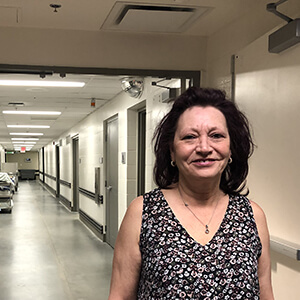
The COVID-19 pandemic is changing our world and health-care professionals are on the front lines.
With the onset of COVID-19 in Manitoba, things have definitely changed for the medical device reprocessing (MDR) department at Misericordia.
“We reprocess reusable instruments used for different surgeries,” says Wilma Withoos, MDR Supervisor.
However, with conservation of certain items – primarily goggles, eye shields and hand sanitizer – the MDR department now has some new reprocessing duties.
“We started with hand sanitizer bottles,” says Wilma, who found a solution to reprocess the pumps as well as the bottles.
Wilma estimates that her team has reprocessed 300 hand sanitizer pump bottles and wall dispensers to date. In addition, the MDR department has also reprocessed hand sanitizer bottles for Deer Lodge Centre and Riverview Health Centre.
All items that are reprocessed go through a multi-step washing and disinfecting process before they’re ready to be re-used. This includes: a pre-rinse, wash, second rinse, thermal disinfectant wash with reverse-osmosis water, a one-minute dry at 190ºF and lastly, items are laid out to be dried with a non-lint surgical towel.
Once sanitized and dried, items are counted, bagged and brought to stores for re-distribution. Since April 1, the MDR department has reprocessed 11,707 items!
“We have a team of 7-8 people working staggered shifts every day, and with elective surgeries starting back up, our workload will increase.”
As elective surgery slates increase at MHC, some work is adjusting back to “normal.”
When asked what she’s looking forward to most post-COVID-19, Wilma exclaims: “I’m excited to see my family in person and hug my grandchildren!”
Keep COVID-19 informed by visiting: covid19manitoba.ca
#mhcfamily #healthcareheroesMB #COVID19
Anglican spiritual care practitioners talk COVID-19, featuring Joan Crabtree.
Linda Lee, Education Services
Linda Lee, Education Services
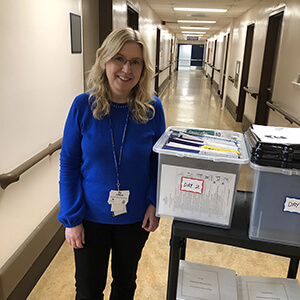
The COVID-19 pandemic is changing our world and health-care professionals are on the front lines.
“Every day is always different, even pre-COVID-19,” says Linda Lee, on her role as an education facilitator at Misericordia.
Linda works primarily educating staff on the Transitional Care Units and PRIME. She also helps facilitate general and long-term care orientation. The Education Services team work collaboratively to disseminate best-practice information and provide mandatory education for staff.
With the onset of COVID-19, Linda and the Education Services team have been mostly working with redeployed MHC staff. For example, providing orientation for clinical staff who’ve moved to long-term care roles.
“I’ve worked with acute-care nurses to educate staff on the personal protective equipment (PPE) process. I’ve also helped with education for new staff who are training to be COVID-19 ‘extenders’ at Health Links – Info Santé,” says Linda about how her job has evolved due to the pandemic.
Physical distancing and proper COVID-19 protocol is always top of mind for Linda when she’s facilitating an education session.
“Our whole means of providing education has changed.”
Normally, long-term education happens with staff sitting in close proximity, learning from one another. Nowadays, Linda relies more on PowerPoint presentations.
“I don’t know if things will be quite the same post-COVID-19. I think that some good things will come out of this all – people will be more aware and value personal interactions.”
Keep COVID-19 informed by visiting: covid19manitoba.ca
#mhcfamily #healthcareheroesMB #COVID19
Pandemic thrusts Health Links – Info Santé into the spotlight
Teresa Peterson, Easy Street
Teresa Peterson, Easy Street
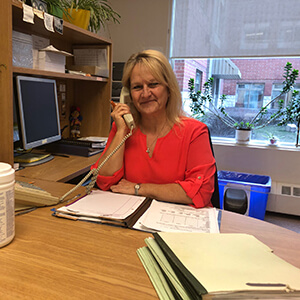
The COVID-19 pandemic is changing our world and health-care professionals are on the front lines.
“Although Easy Street is an out-patient program and clients aren’t coming in now, I’m still providing therapy to all of my clients at regularly scheduled times,” occupational therapist Teresa Peterson explains the effect of COVID-19 on MHC’s unique rehabilitation program.
At Easy Street, clients usually practice the skills they need for independent living after a life-impacting health change such as an acquired brain injury or a stroke.
Located in the Misericordia Health Centre parkade building, Easy Street recreates an actual community environment – including a bank machine, car, grocery store and putting green – equipped to meet the challenges people face on a daily basis.
“Now all therapy is provided over the phone,” says Teresa. “It’s very client-centered and specific to each individual with continuous reassessment and monitoring – which can sometimes be very difficult to do when the person is not right in front of you.
“My caseload right now is of people with traumatic or acquired brain injuries so they need occupational therapy for cognitive retraining … We’re working on orientation, memory, goal setting, problem solving among other things. With some of my younger clients we’re progressing toward return to school or work and addressing things like budgeting and general self-management skills.”
Teresa says a reduction in the interprofessional part of treatment can be difficult as social-distancing guidelines mean team members are not as easily available for discussion about clients: “We’re still communicating, but in a different way now, as some colleagues are distancing in different buildings.”
All of Teresa’s clients have expressed sincere appreciation for the opportunity to continue their therapy. She says in these times of such uncertainty and fear, they are thankful to be able to progress and maintain hope in their recovery.
Teresa is also thankful and feels blessed to be able to continue to provide treatment for her clients, while looking forward to the day she can return to “in person” interactions.
Keep COVID-19 informed by visiting: covid19manitoba.ca
#mhcfamily #healthcareheroesMB #COVID19

